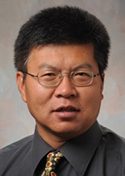Feb 6 2014
University of Akron polymer engineers devised a breakthrough method for developing a new class of sensors critical for environmental monitoring, remote sensing, fiber optic communication, day- and night-time surveillance, and emerging medical imaging devices — for which they received a $400,000 National Science Foundation CAREER award to advance this research.
 Xiong Gong
Xiong Gong
Led by Xiong Gong, assistant professor of polymer engineering, the research entails fabricating and optimizing solution-processed sensors that do not require cooling to function with highly sensitive detection capability. The result: low-cost, multicolor, high-efficiency and high-speed sensory with detection that spans from ultraviolet to infrared.
"The availability of such photodetectors for use at room temperature would offer new and important applications and will certainly have potential to replace current inorganic sensors, which operate at very low temperatures," Gong said, adding that the novel technology holds promising advancements that span from photodetectors for medical devices to sensors used in automobiles. "The NSF funding can catalyze our exploration of infrared polymer photodetectors in these fields."
U.S. Sen Sherrod Brown (D-Ohio), who announced the award Jan. 24, noted in a press release, "Research in science and engineering is critical to creating jobs and improving our economy. The University of Akron is one of Ohio's premier universities. This award will help it advance our knowledge of polymer science and polymer engineering, a field in which Akron is already among the world’s best."